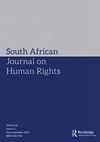In whose best interests? The ECD regulatory framework, understandings of the best interests of the young child and access to quality early education
IF 0.6
4区 社会学
Q3 LAW
引用次数: 1
Abstract
Abstract The Constitution of the Republic of South Africa 1996, and early childhood development policy, legislation and regulations prioritise the best interests of the child. The United Nations Committee on the Rights of the Child General Comment 7 provides guidance on how best interests should be applied for young children to protect their rights and promote their survival, protection, and development, as well as measures to support and assist parents and others responsible for realising children’s rights. The ECD regulatory framework defines quality standards and monitoring is undertaken by local government and provincial education departments. The Children’s Act 38 of 2005 (as amended) provides for ‘developing appropriate parenting skills and capacity of parents and caregivers to safeguard the well-being and interests of children’. These align with General Comment 7. However, a conspicuous gap in the regulatory framework is the limited focus on the programme quality critical for realising the right to education. Further, we contend the contextual factors are not sufficiently considered in the application of ECD regulations. Using a case study approach, we explore how the best interests of the child, regarding access to quality early education, are interpreted by different stakeholders in a diverse, vulnerable community and compare these views with the operationalisation of the best interests principle in our regulatory framework.为了谁的最大利益?幼儿发展监管框架、对幼儿最大利益的理解以及获得优质早期教育的机会
南非共和国1996年宪法以及儿童早期发展政策、立法和法规优先考虑儿童的最大利益。《联合国儿童权利委员会第7号一般性意见》就如何将最大利益适用于幼儿以保护其权利并促进其生存、保护和发展提供了指导,并提出了支持和协助父母和其他负责实现儿童权利的人的措施。幼儿发展管理框架确定了质量标准,并由地方政府和省级教育部门进行监测。2005年第38号《儿童法》(经修订)规定“培养父母和照料者适当的养育技能和能力,以保障儿童的福祉和利益”。这与第7号一般性意见一致。然而,监管框架中的一个明显缺陷是,对实现受教育权至关重要的方案质量关注有限。此外,我们认为在ECD法规的应用中没有充分考虑到环境因素。通过案例研究的方法,我们探讨了在一个多元化的弱势群体中,不同的利益相关者如何解读儿童在获得优质早期教育方面的最大利益,并将这些观点与我们监管框架中最大利益原则的实施情况进行了比较。
本文章由计算机程序翻译,如有差异,请以英文原文为准。
求助全文
约1分钟内获得全文
求助全文

 求助内容:
求助内容: 应助结果提醒方式:
应助结果提醒方式:


